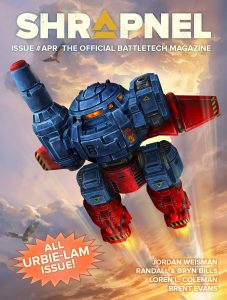Difference between revisions of "Information:Your first article"
(imported) |
(adapting) |
||
| Line 1: | Line 1: | ||
| − | :''This is a page'' '''''about''''' ''writing your first article, not the place to actually write it. If you would like to experiment, please use the [[ | + | :''This is a page'' '''''about''''' ''writing your first article, not the place to actually write it. If you would like to experiment, please use the [[Help:Sandbox|sandbox]].'' |
<!-- PLEASE READ THIS BEFORE EDITING THIS PAGE --> | <!-- PLEASE READ THIS BEFORE EDITING THIS PAGE --> | ||
<!-- This is an article ABOUT writing new articles, NOT the correct place to start writing one. --> | <!-- This is an article ABOUT writing new articles, NOT the correct place to start writing one. --> | ||
| − | <!-- If you are looking for a place to experiment with editing | + | <!-- If you are looking for a place to experiment with editing BattleTechWiki, there's a page called the Sandbox that's designed specifically for that purpose. |
| − | You can reach it by going to http:// | + | You can reach it by going to http://sarna.net/wiki/Help:Sandbox. |
| − | Like everything here at | + | Like everything here at BattleTechWiki, of course, you can edit this page if you think you can improve it.--> |
| − | '''Welcome to | + | '''Welcome to BattleTechWiki!''' This is a guide to some important things you should know before creating your first encyclopedia article. |
# [[Wikipedia:Be bold in updating pages|Be bold]]. | # [[Wikipedia:Be bold in updating pages|Be bold]]. | ||
# [[Special:Userlogin|Sign in]] with your account name. If you do not have an account, you should [http://en.wikipedia.org/w/index.php?title=Special:Userlogin&type=signup create one]. (Unregistered users can write articles using the [[Wikipedia:Articles for creation]] process, but users who register and sign in can create articles much more easily.) | # [[Special:Userlogin|Sign in]] with your account name. If you do not have an account, you should [http://en.wikipedia.org/w/index.php?title=Special:Userlogin&type=signup create one]. (Unregistered users can write articles using the [[Wikipedia:Articles for creation]] process, but users who register and sign in can create articles much more easily.) | ||
| Line 55: | Line 55: | ||
|} | |} | ||
| − | |||
| − | |||
| − | [[Category: | + | [[Category:BattleTechWiki]] |
| − | |||
| − | |||
| − | |||
| − | |||
<!-- PLEASE READ THIS BEFORE EDITING THIS PAGE --> | <!-- PLEASE READ THIS BEFORE EDITING THIS PAGE --> | ||
<!-- This is an article ABOUT writing new articles, NOT the correct place to start writing one. --> | <!-- This is an article ABOUT writing new articles, NOT the correct place to start writing one. --> | ||
| − | |||
| − | |||
| − | |||
Revision as of 02:39, 19 November 2006
- This is a page about writing your first article, not the place to actually write it. If you would like to experiment, please use the sandbox.
Welcome to BattleTechWiki! This is a guide to some important things you should know before creating your first encyclopedia article.
- Be bold.
- Sign in with your account name. If you do not have an account, you should create one. (Unregistered users can write articles using the Wikipedia:Articles for creation process, but users who register and sign in can create articles much more easily.)
- Please don't create pages about yourself or your friends, advertising, or personal essays.
- Be careful about: copying things, controversial material, redundant articles, extremely short articles, and local-interest articles.
Things to avoid
- Articles about yourself, your friends, your website, a band you're in, your teacher, a word you made up, or a story you wrote
- If you are worthy of inclusion in the encyclopedia, let someone else add an article for you. Putting your friends in an encyclopedia may seem like a nice surprise or an amusing joke, but articles like this are likely to be removed. In this process, feelings may be hurt, which can be avoided by a little forethought on your part.
- Advertising
- Please don't try to promote your product or business. Please don't insert external links to your commercial website unless a neutral party would judge that the link truly belongs in the article; we do have articles about products like Kleenex or Sharpies, or notable businesses like McDonald's, but if you are writing about a product or business be sure you write from a neutral point of view.
- Personal essays or original research
- Wikipedia surveys existing human knowledge; it is not a place to publish new work. Do not write articles that present your own original theories, opinions, or insights, even if you can support them by reference to accepted work.
- A single sentence or only a website link
- Articles need to have real content of their own.
- See also:
And be careful about...
- Copying things. Do not violate copyrights. To be safe, do not copy more than a couple of sentences of text from anywhere, and document any references you do use. You can copy material that you are sure is in the public domain, but even for public domain material you should still document your source. Also note that most Web pages are not in the public domain and most song lyrics are not either. In fact most things written since January 1, 1978 are automatically under copyright even if they have no copyright notice or © symbol. If you think what you are contributing is in the public domain, say where you got it, either in the article or on the discussion page, and on the discussion page give the reason why you think it is in the public domain (e.g. "It was published in 1895...") If you think you are making "fair use" of copyrighted material, please put a note on the discussion page saying why you think so. For more information: Copyrights.
- Good research and citing your sources. Articles written out of thin air are better than nothing, but they are hard to verify, which is an important part of building a trusted reference work. Please research with the best sources available and cite them properly. Doing this, along with not copying large amounts of the text, will help avoid any possibility of plagiarism.
- Advocacy and controversial material. Please do not write articles that advocate one particular viewpoint on politics, religion, or anything else. Understand what we mean by a neutral point of view before tackling this sort of topic.
- Redundant articles. Wikipedia already has a lot of articles. Before creating an article, try to make sure there isn't already an article, perhaps under a slightly different name; you can search for it here; check the Wikipedia naming conventions. If an article on your topic is there, but you think people are likely to look for it under some different name or spelling, learn how to add a redirect with that name; adding needed redirects is a good way to help Wikipedia. Also, remember to check the article's deletion log in order to avoid creating an article that has already been deleted.
- Extremely short articles that are just definitions. Try to write a good short paragraph that says something about the subject. We welcome good short articles, called "stubs", that can serve as launching pads from which others can take off. If you don't have enough material to write a good stub, you probably should not create the article. At the end of a stub, you should include a "stub template" like this: {{stub}}. It helps track articles that need expansion. Definitions belong on Wiktionary.
| Questionable | Better |
| A close-up is a shot in a movie taken with the camera close to the actors. | A close-up is a shot in a movie taken with the camera close to, or zoomed in on, the actors. Close-ups are typically brief, and are used to draw attention to the actor's expression. Close-ups are an important part of film grammar. D. W. Griffith invented the close-up as we know it. {{film-stub}} |
- Local-interest articles. These are articles about places like schools, or streets that are of interest to a relatively small number of people such as alumni or people who live nearby. There is no consensus about such articles, but some will challenge them if they include nothing that shows how the place is special and different from tens of thousands of similar places. Photographs add interest. Try to give local-interest articles local colour. Third-party references are good!
| Questionable | Better |
| The University of Notre Dame is located near South Bend, Indiana. It has an undergraduate enrollment of 8000. Its president is Edward A. Malloy. Its school colors are gold and blue. | The University of Notre Dame is a Catholic university located near South Bend, Indiana. It had an undergraduate enrollment of 8000 in 2003. Its president is Edward A. "Monk" Malloy. It is famous for its football team, the "Fighting Irish," and for its landmark Golden Dome. The school colors worn by its sports teams are gold and blue. |
| Canal Street is a street in New York. | Canal Street is a major street in lower Manhattan. It is a ramshackle but bustling commercial district. Tourists and locals pack the Canal Street sidewalks every day to frequent its open-air food stalls, and its bare-bones stores selling items such as perfume, purses, hardware, industrial plastics, and pirated DVDs. |
| Louis' Lunch makes the best damn hamburgers in New Haven. | Louis' Lunch is a restaurant in New Haven, Connecticut, famous for its hamburgers. The proprietors claim that Louis' Lunch was, in 1895, the first place in the United States to serve hamburgers as we know them today. The Library of Congress has material apparently supporting this claim. |


